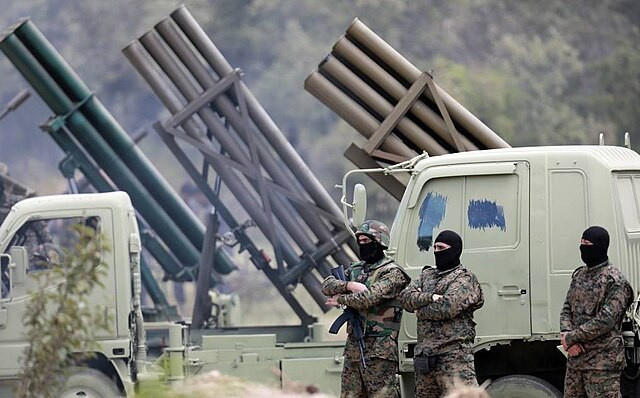In a dramatic escalation of the ongoing conflict between Hezbollah and Israel, the Lebanese militant group launched over 200 rockets at Israeli military bases on Thursday. This retaliation came in response to the killing of Mohammad Naameh Nasser, a senior Hezbollah commander, by Israeli forces.
The Iran-backed Hezbollah group claimed responsibility for the massive barrage, marking one of the largest attacks in the months-long conflict along the Lebanon-Israel border. The Israeli military reported that numerous projectiles and drones entered its territory, many of which were intercepted. The attack resulted in the death of one Israeli soldier.
Following Hezbollah's offensive, Israel responded with airstrikes targeting Hezbollah's military structures in southern Lebanon. The Israeli Defense Forces (IDF) confirmed hitting sites in the border towns of Ramyeh and Houla, while Lebanon's state-run National News Agency reported an Israeli drone strike in Houla, resulting in at least one fatality. Israeli jets also conducted low-altitude flights over Beirut, causing sonic booms.
The conflict has seen an escalation since the outbreak of the war in Gaza, with Hezbollah expressing solidarity with Hamas, another Iran-allied group. The current hostilities began shortly after Hamas launched an attack into southern Israel on October 7, 2023. Hezbollah has stated that its strikes will continue until a ceasefire is reached in Gaza.
Mohammad Naameh Nasser, the Hezbollah commander whose death triggered the latest wave of violence, was a key figure in the group. He played significant roles in conflicts in Syria and Iraq from 2011 to 2016 and participated in the 2006 war with Israel. Nasser's death follows the killing of another senior Hezbollah commander, Sami Taleb Abdullah, last month, which also led to retaliatory strikes.
Hezbollah's Executive Council head, Hashem Safieddine, vowed that the group would continue its attacks, targeting new sites and causing numerous casualties, although Israel has not always acknowledged these hits.
The U.S. and France are actively working to prevent the conflict from escalating into a full-scale war. Diplomatic efforts have included pushing regional brokers like Egypt and Qatar to exert pressure on Hamas for a ceasefire. The Biden administration has emphasized that an end to the war in Gaza would likely lead to calm along the Lebanon-Israel border.
The ongoing conflict has displaced tens of thousands on both sides. In northern Israel, 16 soldiers and 11 civilians have been killed, while in Lebanon, more than 450 people, mostly fighters but also dozens of civilians, have lost their lives.
Hezbollah, one of the most powerful paramilitary forces in the Middle East, boasts tens of thousands of fighters and an extensive missile arsenal. Israel views Hezbollah as its most direct threat, estimating the group has around 150,000 rockets and missiles, including precision-guided munitions.
The 2006 war between Israel and Hezbollah lasted a month and ended in a draw. The current conflict, with its near-daily cross-border exchanges of fire, threatens to reignite full-scale hostilities. The IDF has warned that it might decide to go to war in Lebanon if diplomatic solutions fail.
Amidst the violence, Israeli officials have expressed concerns over Hezbollah's significant military capabilities. The IDF has reported extensive fires in northern Israel caused by the heavy shelling from Lebanon. Over 40 firefighting teams and 10 aircraft have been deployed to manage the situation.




